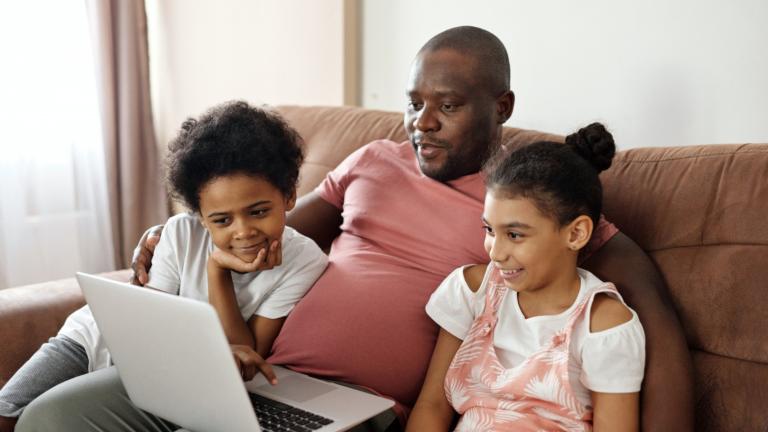Fostering Digital Inclusion for Families

This blog is co-authored by Caroline Waldman, United Way Worldwide Communications Manager
The digital divide describes the gap between those individuals who have access to computers and internet connection and those who do not. This problem became more apparent at the onset of the COVID-19 pandemic, which necessitated the technical requirements for remote online learning, but the digital divide is not just an issue facing students who are unable to get their homework done outside of the classroom. Imagine trying to pay your bills, apply for jobs, and file your taxes all on a smartphone. And yet, 4 in 10 lower-income adults do not have access to broadband services or have a computer at home.
According to the Pew Research Center, 27% of adults in households earning less than $30,000 a year use only their smartphones to access the internet — they do not have broadband at home. This gap is widening; in 2013, only 12% were without a home computer and internet connection.
Getting individuals and families connected to the internet is an important step on the path to financial stability and economic mobility. That’s why Ernst & Young LLP (EY US) teamed with United Ways across the U.S. to help provide internet connectivity, digital devices, and online mentoring opportunities for underserved students and their families.
This past year, EY US and its people raised $1.5 million during the annual giving campaign to help United Way:
- Provide 27,622 laptop and desktop computers to students
- Serve 8,578 students through digital support, mentoring, tutoring, and meals
- Engage 9,505 households
- Connect 5,900 individuals to internet hotspots/Wi-Fi
In Texas, United Way Metropolitan Dallas is closing the digital divide for displaced workers by helping them advance their digital skills. With EY support, United Way launched a Digital Skills Training Program in partnership with State Fair of Texas, CARDBoard Project, Dallas Innovation Alliance, and CitySquare to provide digital literacy skills to 150 Dallas residents by July 2022. Through the six-week training program, workers will learn software proficiency and digital literacy and receive job search assistance, with the goal of moving from entry-level positions into middle skills jobs.
In Kansas, EY support has helped foster digital inclusion for low-income families. United Way Greater Kansas City invested $30,000 from EY US in PCs for People, a program that brings computers, mobile hotspot programs, internet service, and refurbished devices to families in need. The average family receiving a computer through the program earns about $16,000 annually. Nearly 60 percent have not previously owned a computer, and 58 percent are unemployed. With this support, these families now have access to the benefits that computers and internet connectivity provide, like job searching, online bill pay, and remote learning.
United Way and EY US will continue to leverage the collective power of our networks to provide access and connectivity to communities across the United States. Together, we will work to address the learning gap that results from the digital divide, focusing on upskilling, learning, and mentoring for young people and adults in need.
Carolina Dominguez is EY Americas Mentoring Programs Leader.
Caroline Waldman is Manager, Communications, United Way Worldwide.
The views expressed by the authors are their own and not necessarily those of Ernst & Young LLP or other members of the global EY organization or United Way Worldwide.